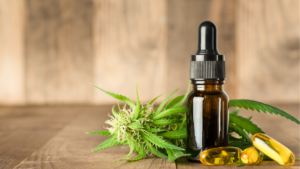As more states move to legalize cannabis, increasingly more people are warming up to cannabinoid-based therapies. At the same time, Δ9-tetrahydrocannabinol (THC) is gaining considerable interest in mental health. This is causing mixed reactions, with some questioning the long-term effects of cannabis use.
Dopamine is a neurotransmitter that mediates the feeling of pleasure, motivation, and satisfaction in the brain. The release of dopamine motivates one to pursue a pleasurable activity or occupation. A dopamine surge is what makes you feel good after achieving something significant. The right balance of dopamine is vital for both physical and mental wellbeing.
THC is a major cannabinoid of the cannabis plant with clear intoxicating effects. It binds to the CB1 receptor in the brain to elicit its psychoactive properties.
Anandamide, also known as the bliss molecule, is an endogenous cannabinoid that also binds the CB1 receptor. It is not surprising that both anandamide and THC are associated with a feeling of happiness and satisfaction. However, anandamide, unlike THC, is quickly broken down by enzymes and taken out of circulation.
What’s the Link Between Cannabis and Dopamine?
The endocannabinoid system modulates the dopaminergic system through CB1 receptors and endocannabinoids.
Endocannabinoids stimulate the release of dopamine. Certain CB1 antagonists can block this effect, demonstrating that CB1 receptors are involved in the dopaminergic effects of cannabinoids.
The link between cannabis and dopamine has to be the CB1 receptors (part of the endocannabinoid system).
There is evidence of varying effects of acute vs. chronic THC exposure on the dopaminergic system.
Acute Vs. Long-term Cannabis Use
Animal studies have described the interactions that exist between amphetamine (promote dopamine release) and THC. These preliminary studies have demonstrated that the dose of THC consumed potentiates or antagonizes the effects of amphetamines. The researchers in this study proposed that dopamine is “a prime candidate for…the mode of action of Δ9-tetrahydrocannabinol”.
Acute versus longer-term use of THC could have complex effects on dopamine synthesis and release. While early studies with rodents show that low doses of THC increased dopamine synthesis and release, some studies show high doses of THC resulting in decreased dopamine synthesis.
The results from human studies have not been consistent, however there is evidence that there may be reduced dopaminergic function among cannabis users.
Indeed, THC has profound effects on the dopamine system, contributing to its recreational and harmful effects. Unfortunately, there are no randomized human trials that have been carried out to investigate this phenomenon. Additionally, inconsistencies between preclinical and clinical findings pose a significant challenge. One major inconsistency between animal and human studies is that THC, even in acute studies, was not administered to humans in the habitual manner in which it was typically consumed.
The Crux of the Matter
THC’s rewarding properties are triggered by the firing of dopaminergic neurons and the release of dopamine in lower doses. Interactions with the CB1 receptors underpin this process.
Evidence suggests that acute vs. chronic THC exposure to the dopaminergic system will produce different effects; that is the crux of the matter.
Acute exposure to THC may cause increased dopamine release, which is associated with a feeling of pleasure.
On the other hand, chronic or long-term exposure to THC has been linked to blunting of the dopamine system.
While acute exposure to THC may increase a sense of reward and satisfaction, long-term exposure may produce opposite effects. However, the premise of this argument is based on inconclusive, preliminary evidence. Future studies will shed more light on how cannabis affects dopamine over time.
Disclaimer
The Realm of Caring Foundation specifically invokes the first amendment rights of freedom of speech and of the press without prejudice. These statements have not been evaluated by the food and drug administration. the products discussed are not intended to diagnose, cure, prevent or treat any disease. Realm of Caring always recommends when and wherever possible that licensed local healthcare professionals be consulted.
The Realm of Caring Foundation is an independent nonprofit with its own governing board. We do not produce or sell cannabinoid products, nor do we receive funds from the sale of other company’s products.






